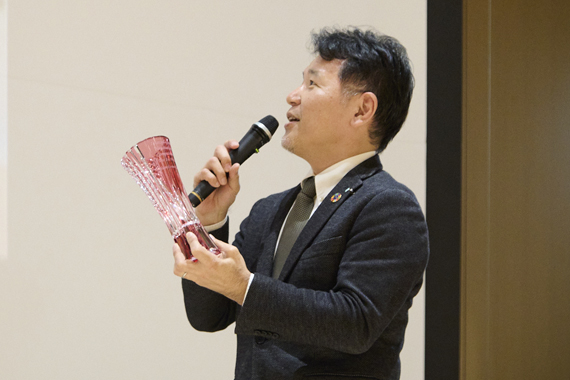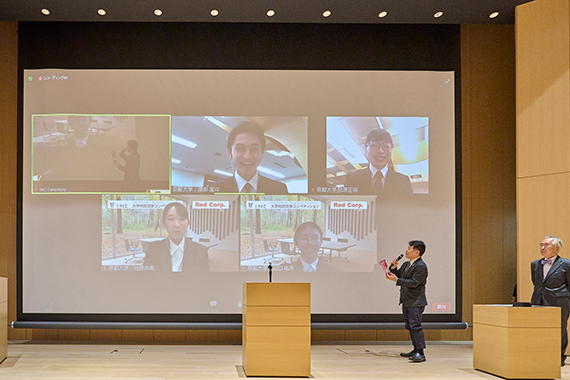Support for the Intercollegiate Negotiation Competition
The Sumitomo Group Public Affairs Committee strives to support university students’ negotiation skills, assist in upgrading higher education, and contribute to global human resources development through the Intercollegiate Negotiation Competition.
Intercollegiate Negotiation Competition website
21st (2022) Intercollegiate Negotiation Competition
On November 19 and 20, 2022, the 21st Intercollegiate Negotiation Competition (INC) was held. Whereas INC was held online for the past two years in view of the COVID-19 pandemic, the 21st INC was held in a hybrid format, being divided between the physical venue of Sophia University in Tokyo and online.
The contestants were 247 students of 34 teams competing in Japanese and 20 competing in English. 20 Japanese universities participated: Hokkaido University, Tohoku University, the University of Tokyo, Waseda University, Sophia University, Chuo University, Gakushuin University, Nihon University, Meiji University, Rikkyo University, Tsukuba University, Hitotsubashi University, Keio University, Nagoya University, Kyoto University, Doshisha University, Ritsumeikan University, Osaka University, Kyushu University, and Seinan Gakuin University. Seven teams participated from overseas: Team Australia (representing the Australian National University and the University of Sydney), the National University of Singapore, the National University of Mongolia, Beijing Normal University, SolBridge International School of Business, University of Indonesia, and Tilburg University.
Tournament chart
<Japanese>
|
Round A / arbitration |
Round B / negotiation |
| Red |
Blue |
Red |
Blue |
| 1 |
Tsukuba |
Rikkyo 1 |
Mongolia |
Tokyo 2 |
| 2 |
Hokkaido |
Kyushu 2 |
Hokkaido |
Doshisha 3 |
| 3 |
Kyoto |
Tokyo 1 |
Nihon 1 |
Tohoku 1 |
| 4 |
Meiji 3 |
Osaka 1 |
Meiji 2 |
Waseda 1 |
| 5 |
Sophia 3 |
Rikkyo 2 |
Tsukuba |
Kyushu 1 |
| 6 |
Nihon 1 |
Ritsumeikan |
Sophia 1 |
Hitotsubashi |
| 7 |
Sophia 1 |
Kyushu 1 |
Nihon 2 |
Rikkyo 1 |
| 8 |
Gakushuin 2 |
Hitotsubashi |
Sophia 2 |
Tohoku 2 |
| 9 |
Nihon 2 |
Waseda 2 |
Meiji 3 |
Kyushu 2 |
| 10 |
Seinan Gakuin |
Doshisha 1 |
Chuo 1 |
Osaka 1 |
| 11 |
Chuo 1 |
Tohoku 1 |
Kyoto |
Doshisha 2 |
| 12 |
Gakushuin 1 |
Doshisha 2 |
Seinan Gakuin |
Osaka 2 |
| 13 |
Chuo 2 |
Waseda 1 |
Gakushuin 2 |
Tokyo 1 |
| 14 |
Sophia 2 |
Osaka 2 |
Meiji 1 |
Doshisha 1 |
| 15 |
Mongolia |
Doshisha 3 |
Gakushuin 1 |
Rikkyo 2 |
| 16 |
Meiji 1 |
Tohoku 2 |
Chuo 2 |
Ritsumeikan |
| 17 |
Meiji 2 |
Tokyo 2 |
Sophia 3 |
Waseda 2 |
<English>
|
Round A / arbitration |
Round B / negotiation |
| Red |
Blue |
Red |
Blue |
| 1 |
Singapore 1 |
Kyushu |
Chuo 2 |
Doshisha |
| 2 |
Chuo 1 |
Australia |
Sophia 1 |
Indonesia |
| 3 |
Tilburg |
Doshisha |
Singapore 1 |
Keio |
| 4 |
Sophia 2 |
Keio |
Meiji |
Beijing Normal |
| 5 |
Singapore 2 |
Beijing Normal |
Mongolia |
Rikkyo |
| 6 |
Mongolia |
Nagoya 2 |
Sophia 2 |
Australia |
| 7 |
Meiji |
Nagoya 1 |
Chuo 1 |
Kyushu |
| 8 |
Solbridge |
Rikkyo |
Singapore 2 |
Nagoya 1 |
| 9 |
Sophia 1 |
Tokyo |
Tilburg |
Nagoya 2 |
| 10 |
Chuo 2 |
Indonesia |
Solbridge |
Tokyo |
Problems and the Competition Outline
The competition consists of two parts, Round A devoted to arbitration and Round B devoted to negotiation, with Japanese and English divisions for each part. In both Round A and Round B, teams discuss international transactions as the protagonists of either Red Corp., which produces movies and animations and designs as well as related goods, clothing, and other items, or Blue Inc., which produces movies and animations, distributes movie content over the Internet, and operates theme parks.
The issues to be arbitrated in Round A were 1) Blue’s breach of its contractual obligation to Red in relation to an agreement for joint production of a movie and liability for damages, 2) Red’s breach of its contractual obligation to Blue in relation to a clothes sales agreement and liability for damages, and 3) validity of the arbitration agreement and seeking of a declaration that Blue has no right to distribute the movie in question through Blue Net or to sell cards at Blue Land, payment of part of Blue’s revenue to Red, and an injunction against online distribution and the sale of the cards. The teams acted as the attorneys representing either Red or Blue and stated their claims in the presence of the arbitrators whose roles were played by the judges.
In Round B, the teams negotiated on 1) construction of Blue Land (a theme park) in Negoland and 2) distribution of Red’s works on Blue Net.
Judges and Officials
Over the two days, a total of 120 people, including legal professionals, academics, and corporate legal staff, extended cooperation to INC by serving as judges. There were 27 matches. Some matches were held online or in a hybrid format (certain judges and contestants participated online). INC alumni supported INC as officials in charge of reception, operation, and matches held in a hybrid format.
Results of the 21st Intercollegiate Negotiation Competition
The awards ceremony always has an element of high drama. On the one hand, there is the delight of the winning team, and on the other hand, the disappointment of the runners-up. The drama attests to the contestants’ commitment and enthusiasm. Kyoto University won both the first prize and the Best Teamwork Award. The teams with the highest scores in the competition in Japanese were Kyoto University for arbitration and Kyoto University for negotiation, too. The teams with the highest scores in the competition in English were National University of Mongolia for arbitration and Team Australia for negotiation.
| 1st prize |
Kyoto University |
228.5 points |
| 2nd prize |
Team Australia |
227.5 points |
| 3rd prize |
National University of Singapore |
210 points |
| 4th prize |
The University of Tokyo |
207.33 points |
| 5th prize |
Kyushu University |
205 points |
| 6th prize |
Sophia University |
204.4 points |
| 7th prize |
Osaka University |
203.5 points |
Best Teamwork Award
Kyoto University
Highest score for the competition in Japanese for arbitration
Kyoto University
Highest score for the competition in Japanese for negotiation
Kyoto University
Highest score for the competition in English for arbitration
National University of Mongolia
Highest score for the competition in English for negotiation
Team Australia

 EN
EN
